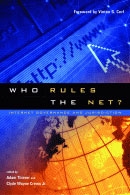- Previous message: Declan McCullagh: "[Politech] Florida university locks out P2P users --Wired News"
- Messages sorted by: [ date ] [ thread ] [ subject ] [ author ]
---
Subject: Cato conference on Net governance (10/21)
Date: Fri, 3 Oct 2003 11:23:12 -0400
From: "Adam Thierer" <athierer@private>
To: <declan@private>
Declan:
Given your interest in these issues, I thought you might be interested
in possibly attending our October 21st event on Internet jurisdiction &
governance. Or perhaps you could forward this invite along to your Politech
subscribers. I think they would be very interested in attending. The event
is free of charge and open to the public. And we have a great group of
speakers and keynoters. The event invite is attached. Many thanks, Adam
Thierer
To attend to the Oct. 21st conference:
<http://www.cato.org/events/techconf03/>http://www.cato.org/events/techconf03/
To order the new book:
<http://www.catostore.org/index.asp?fa=ProductDetails&pid=1441156>http://www.catostore.org/index.asp?fa=ProductDetails&pid=1441156
_____________________________________
<http://cato-subscriptions.org/c.html?rtr=on&s=77z,3nrt,94v,dmd3,fe2s,jbf3,ipqz>
30e9ad5.jpg
Who Rules the Net?
Debating Internet
Jurisdiction and Governance
The Cato Institute's Seventh Annual
TECHNOLOGY & SOCIETY CONFERENCE
Tuesday, October 21, 2003
Cato Institute * F. A. Hayek Auditorium
Washington, D.C.
<http://cato-subscriptions.org/c.html?rtr=on&s=77z,3nrt,94v,1ql,kst4,jbf3,ipqz#register>Register
online or send an email to <mailto:kbrand@private>kbrand@private
---------------------------------------------------------------------------------------------------
7:30-8:00 a.m. Registration
8:00-8:10 a.m. Welcoming Remarks
Clyde Wayne Crews Jr., Director of Technology Policy, Cato Institute
Adam D. Thierer, Director of Telecommunications Studies, Cato Institute
8:10-8:55 a.m. Opening Keynote Address
Hon. Christopher Cox (R-Calif.), Chairman, House Policy Committee
9:00-10:30 a.m. PANEL 1: "Governance: Debating the Rise of Legal and
Technological Borders on an Open Internet"
Tim Wu, University of Virginia Law School
David Post, Temple University Law School
Bruce Kobayashi, George Mason University School of Law
Peter Trooboff, Covington & Burling
Gary Jackson, Quova
10:30-10:45 a.m. Break
10:45 a.m.-12:00 p.m. PANEL 2: "Who Rules? Current Clashes and the Future
of Online Jurisdiction"
Robert Corn-Revere, Davis Wright Tremaine
Kurt Wimmer, Covington & Burling
Michael Greve, American Enterprise Institute
Jonathan Band, Morrison & Foerster
Marc Pearl, IT Policy Solutions
12:00-12:45 p.m. Luncheon Address
Jeffrey J. Kovar, U. S. Department of State Chief U. S. Negotiator, Hague
Convention, and Assistant Legal Adviser for Private International Law
12:45 p.m.- Lunch
<http://cato-subscriptions.org/c.html?rtr=on&s=77z,3nrt,94v,1ql,kst4,jbf3,ipqz#register>Register
online or send an email to <mailto:kbrand@private>kbrand@private
---------------------------------------------------------------------------------------------------
About the Conference
Many people have praised the Internet for its ubiquitous and "borderless"
nature and argued that this global medium is revolutionary. Indeed, the
World Wide Web increasingly challenges traditional concepts of
jurisdiction, governance, and sovereignty. In the universe of cyberspace
there are no passports, and geography is often treated as a meaningless
concept.
But does that mean that traditional concepts of jurisdiction and governance
are obsolete? When legal disputes arise in cyberspace, or when governments
attempt to apply clashing legal standards or cultural norms to the
Internet, how are such matters to be adjudicated? The variance in
regulatory preferences from country to country is highlighted by policy
disputes over free speech and libel, privacy, intellectual property,
antitrust policy, and domain name registration, among other things. Myriad
laws and regulations for "real" space are now being directly challenged by
the rise of the parallel electronic universe known as cyberspace. Who is
responsible for setting the standards in cyberspace? Is a "UN for the
Internet" or a multinational treaty appropriate? If not, whose standards
should govern cross-border cyber disputes? Are different standards
appropriate for cyberspace and "real" space? Those nagging questions are
being posed with increasing frequency.
This year's Technology & Society conference marks the release of the new
Cato book
<http://cato-subscriptions.org/c.html?rtr=on&s=77z,3nrt,94v,df7u,3vf9,jbf3,ipqz>Who
Rules the Net? Internet Governance and Jurisdiction. The conference will
explore the newest developments in Internet jurisdiction and assess the
future of public policy online.
About The Cato Institute
The Cato Institute is a public policy research foundation dedicated to the
principles of limited government, individual liberty, free markets, and
private property. It takes its name from Cato's Letters, popular
libertarian pamphlets that helped to lay the philosophical foundation for
the American Revolution.
Despite the Founders' libertarian values, today virtually no aspect of life
is free from government encroachment. A pervasive intolerance for
individual rights is shown by government's arbitrary intrusions into
private economic transactions and its disregard for civil liberties.
To counter that trend, the Cato Institute undertakes an extensive
publications program that addresses the complete spectrum of policy issues.
It holds major conferences throughout the year, from which papers are
published thrice yearly in the Cato Journal, and also publishes the
quarterly magazine Regulation.
The Cato Institute accepts no government funding. It relies instead on
contributions from foundations, corporations, and individuals and revenue
generated from the sale of publications. The Institute is a nonprofit,
tax-exempt educational foundation under Section 501(c)(3) of the Internal
Revenue Code.
Cato Institute * 1000 Massachusetts Ave., N.W. * Washington, D.C. 20001 *
<http://cato-subscriptions.org/c.html?rtr=on&s=77z,3nrt,94v,aihw,4qf,jbf3,ipqz>www.cato.org
 _______________________________________________
Politech mailing list
Archived at http://www.politechbot.com/
Moderated by Declan McCullagh (http://www.mccullagh.org/)
_______________________________________________
Politech mailing list
Archived at http://www.politechbot.com/
Moderated by Declan McCullagh (http://www.mccullagh.org/)
- Next message: Declan McCullagh: "[Politech] Verisign's "SiteFinder" site -- not offline yet"
- Previous message: Declan McCullagh: "[Politech] Florida university locks out P2P users --Wired News"
- Messages sorted by: [ date ] [ thread ] [ subject ] [ author ]
This archive was generated by hypermail 2b30 : Fri Oct 03 2003 - 20:58:08 PDT